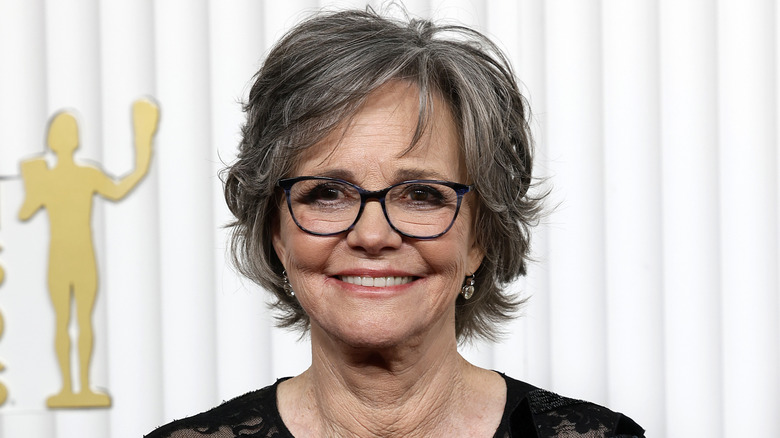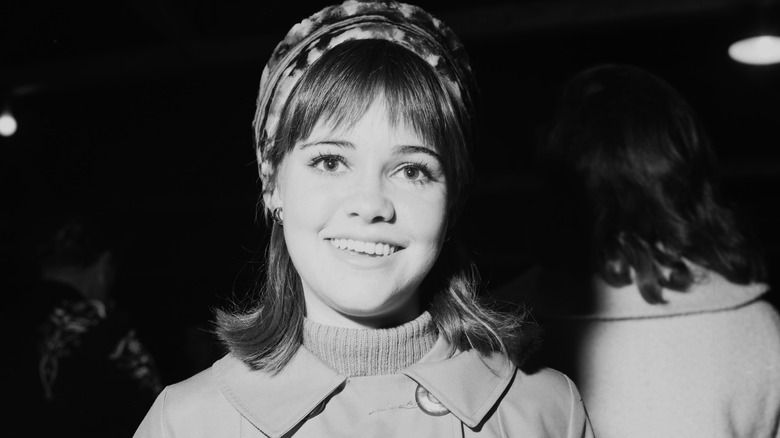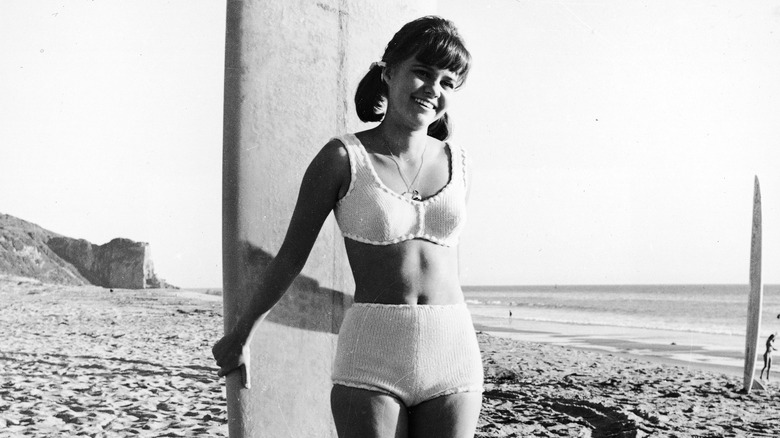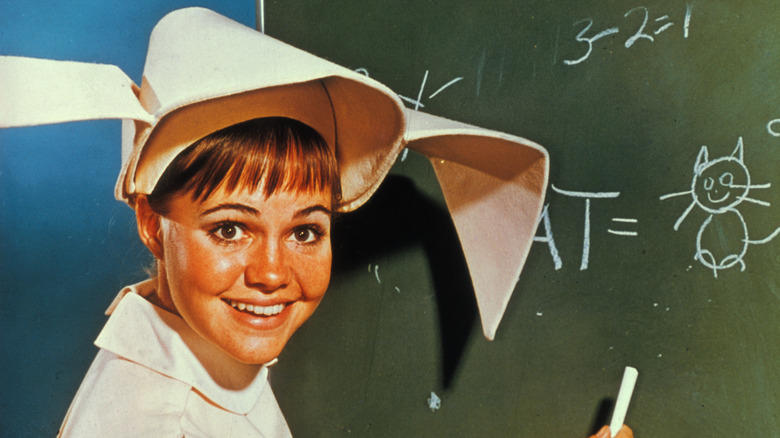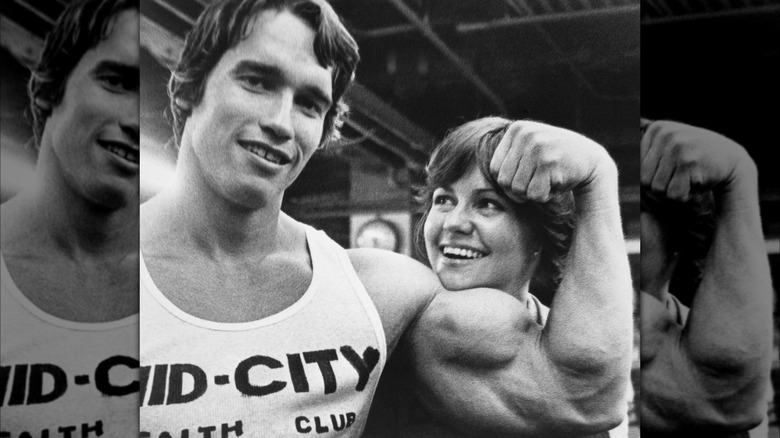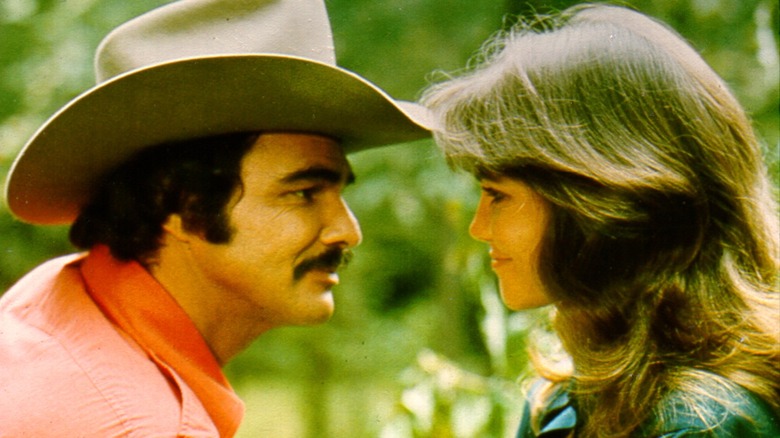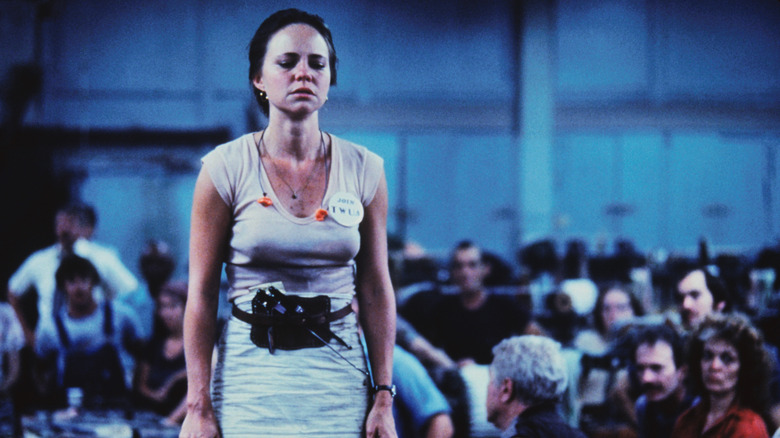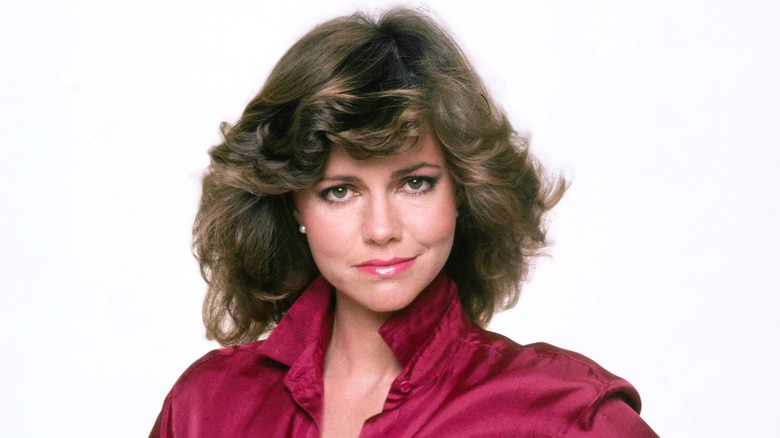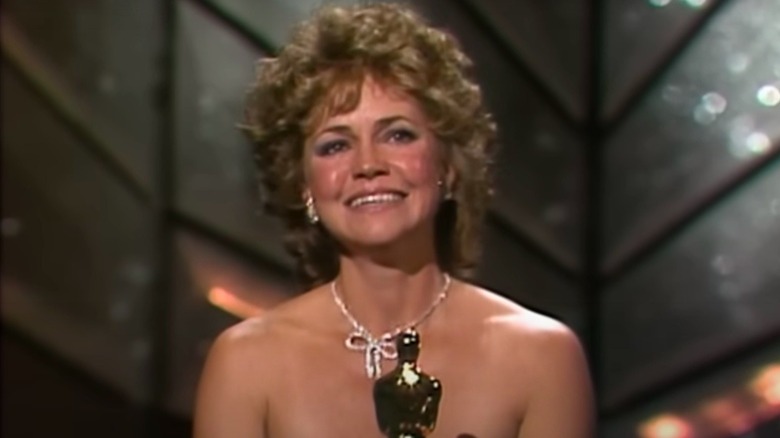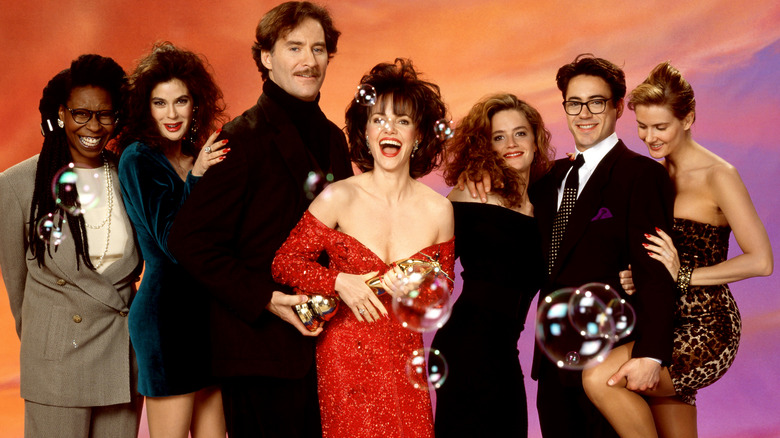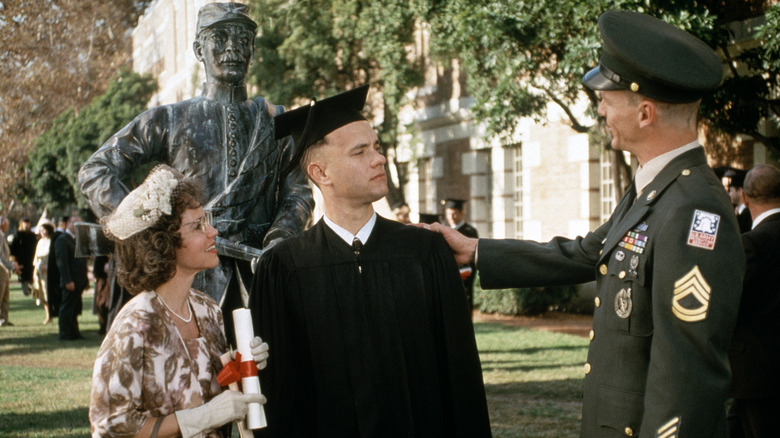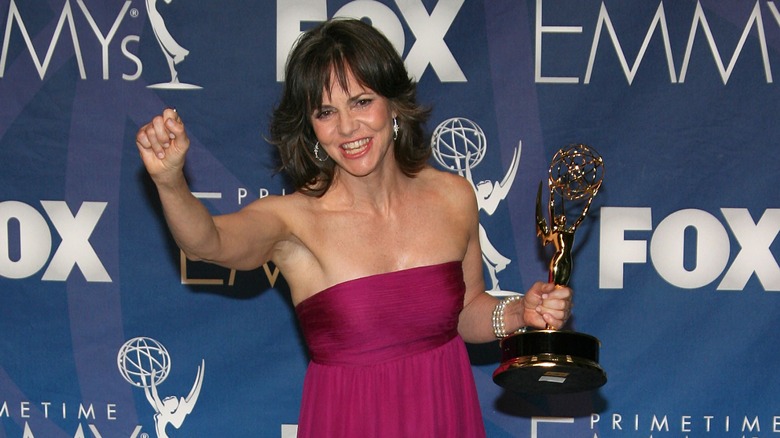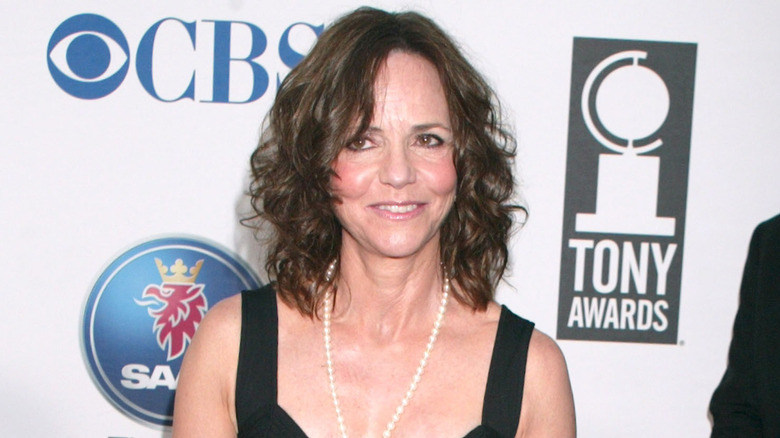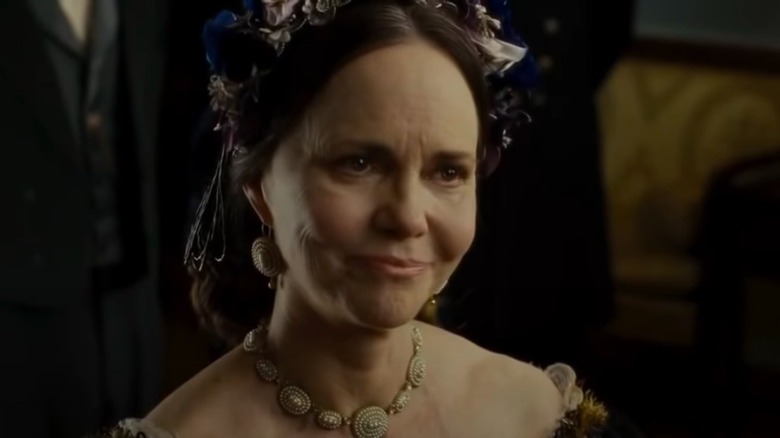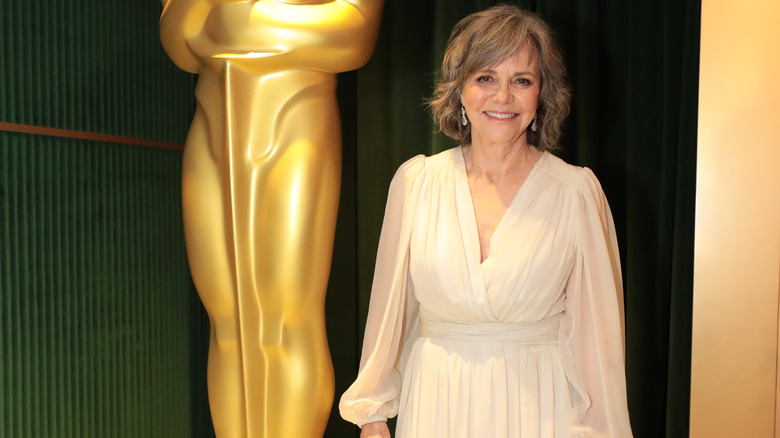We Can't Stop Staring At Sally Field's Transformation
Few actors can boast of a career as long, distinguished, and diverse as the one of Sally Field. Born in Pasadena, California in 1946, Field grew up surrounded by showbiz; Her mom, Margaret Field, was an actor who appeared in numerous films and TV series from the 1940s through the '70s.
She got her start at a young age, cast in the starring role in a high-profile TV series when she was still a teenager. That TV gig launched a wildly successful Hollywood career that's seen her demonstrate her talent at comedy, drama, and all points in between. She has also dabbled in directing and producing, and has received a cavalcade of industry honors, including two Oscars, three Emmys, two Golden Globes, and two Screen Actors Guild Awards (one of which was for lifetime achievement).
Having celebrated her 77th birthday in 2023, Field has demonstrated no inclination of slowing down, let alone retiring. In fact, she acted in the 2022 HBO series, "Winning Time: The Rise of the Lakers Dynasty," was featured that same year in the film, "Spoiler Alert," and, starred the following year in the fan-favorite flick, "80 for Brady." While Field's undeniable talent and vibrant personality have remained the same, she had has quite the transformation throughout her decades-long career.
Acting helped Sally Field overcome an abusive childhood
After Sally Field's parents divorced, her mother married actor and stuntman Jock Mahoney, known for playing Tarzan. In her 2018 memoir, "In Pieces," Field revealed that Mahoney sexually abused her until she was 14. "I felt both a child, helpless, and not a child. Powerful. This was power. And I owned it. But I wanted to be a child — and yet," she wrote, as excerpted by Vulture.
In a 2008 interview with Oprah Winfrey for O, The Oprah Magazine, Field recounted how her stepfather would occasionally become physically abusive as well. "There was always the threat of violence in the air, and a few times, it turned physical. I never felt safe," she said. As Field grew older, she gravitated toward acting.
Not only was the theatrical arts something she grew up around with her actor mother, but it also proved to be a solace from her unhappy home life. "In high school, acting is what I did to stay sane," she explained in the interview. "It wasn't about showing off; it was about revealing parts of myself that I couldn't reveal anyplace else." When Field was honored by her former high school in 2010 by naming its performing arts theater after her, she recalled (via CBS News) how the school's drama department had "quite simply saved [her] life."
If you or anyone you know has been a victim of sexual assault, help is available. Visit the Rape, Abuse & Incest National Network website or contact RAINN's National Helpline at 1-800-656-HOPE (4673).
She became television's Gidget at just 18 years old
When she graduated from high school in 1964, 18-year-old Sally Field had no real plans about what she would do next. "The only thing I knew was that I had to keep acting," she told O, The Oprah Magazine. Figuring she should pursue it professionally, she attended an acting workshop. After her first class, she was approached by a casting agent. That conversation led to an audition for the leading role in "Gidget," a TV sitcom based on the 1959 hit surf movie of the same name. "At my screen test, I walked in and said, 'Which one is the camera?' The crew members were like, 'Oh, boy," Field shared in the interview.
Despite not having much professional acting experience, Field landed the role, starring as the titular Gidget for the series' single-season run in 1965. Given her inexperience, it shouldn't be surprising that Field infused aspects of her own personality into Gidget. "That character was the superficial part of me that I learned to use to protect myself," she explained. "I played Gidget when I wanted to entertain people but keep some distance. When I was Gidget, no one ever really knew me."
Her role in "Gidget" not only made Field a star, but also adjusted her outlook on life. "Something in me was changed by that experience because of her optimism and her ability to move into the future, when I didn't have that ability for various reasons," Field revealed in an interview with Sessums Magazine.
Field was hesitant to play The Flying Nun
After ABC canceled "Gidget," the network was keen to cast Sally Field in another sitcom. Against her better judgment, she agreed to play Sister Bertrille in the zany 1967 sitcom, "The Flying Nun," which, in retrospect, wasn't exactly a high-water mark for television. "Every fibre in my body did not want to do it," she told Sessums Magazine. It wasn't until her stepfather warned that if she turned it down, she may never work in the industry again that she accepted the role. "I did it because I was afraid," she explained.
The show was a ratings hit, yet Field was miserable and not particularly fond of her character. "She was a jerk! You know?" Field ranted to "CBS This Morning." "She was a mindless idiot — there was nothing real to play." One day, while filming a scene with co-star Madeleine Sherwood, Field simply couldn't bring herself to continue. "I folded up and fell to the floor and just sat there with my head in my hands," she recalled to Sessums Magazine. Finally, she was sent home for the day.
When Field returned to set, Sherwood pulled her aside for a private conversation. "She slipped a piece of paper in my hand and looked at me sort of fiercely and said, 'Be here. Next Tuesday. It's 10 minutes away ... There's no excuses.'" Written on the paper was the address of the Actors Studio. "I met her there that Tuesday," Field said. "And it began to change my life."
Her shift to drama with Stay Hungry and Sybil
When "The Flying Nun" was mercifully canceled in 1970, Sally Field didn't jump back into another series. Instead, she landed a few TV movies and guest-starred in roles for various TV series — all while continuing to work with legendary acting coach Lee Strasberg at the Actors Studio. When her 1973 sitcom, "The Girl with Something Extra," flopped after one season, she devoted the next two years to studying and developing her craft. "I've been in the Actors Studio ever since I did the nun," Field said in a 1977 interview with The New York Times. "So when I did that last television series, I said, 'That's it.' I turned down all television things that were offered to me."
Her big opportunity came when she was cast in director Bob Rafelson's 1976 film, "Stay Hungry," which was set in a gym and marked the Hollywood debut of Arnold Schwarzenegger. While the charismatic bodybuilding champion understandably garnered much of the attention, Field delivered a poignant performance that was worlds apart from the sitcom silliness of "The Flying Nun."
All that training further paid off when she was cast in "Sybil," a 1976 made-for-TV movie about a woman with 16 distinct personalities. Field's Emmy-winning portrayal of the titular character was a revelation to those who only knew her from her sitcom roles. "They've finally discovered that the all‐American girl next door can also be crazy, wacko," she joked to The New York Times.
Her not-so-glamorous romance with Burt Reynolds
Sally Field's next big film role came with the 1977 comedy, "Smokey and the Bandit," in which she played the love interest to Burt Reynolds's Bandit. The spark that audiences saw between their characters had little to do with acting, and before the film made it into theaters, the two actors had become a couple.
Field co-starred with Reynolds in more films — 1978's "Hooper" and "The End" — but by the time they made 1980's "Smokey and the Bandit II," the romance was already on the way to being over. The couple would later split up in 1982, as her career was heating up. "He really was not a nice guy around me then," Field revealed in the book "50 Oscar Nights" (via People).
While fans assumed their real-life relationship mirrored what they saw on screen, the truth was far more nuanced. After the 2018 death of Reynolds — who had referred to Field as the love of his life — she set the record straight in an interview with Variety. "He was not someone I could be around," she said of why they hadn't spoken in 30 years. "He was just not good for me in any way. And he had somehow invented in his rethinking of everything that I was more important to him than he had thought, but I wasn't. He just wanted to have the thing he didn't have. I just didn't want to deal with that."
Winning the Oscar for Norma Rae was a game changer
Sally Field starred in two films in 1979, "Beyond the Poseidon Adventure" and "Norma Rae," but it was the latter that resulted in her first Oscar nomination. In the critically acclaimed drama, Field starred as the titular character, a single mom who organizes her co-workers in a textile mill to form a union. When she was announced winner in the best actress category, nobody was more surprised than Field. "They said this couldn't be done," she said in her acceptance speech.
For Field, winning her first Oscar was a hallucinatory experience. "I really wasn't there in my body. I didn't exist. It was so overwhelming. I don't know that I actually allowed any of it to sink in and feel it. All of that time onstage or hearing my name ... I was on some autopilot just to make it through," she told Variety in 2022, recalling the experience more than four decades later.
That Oscar would open doors for the actor, leading to several high-profile movies in the years that followed. "It certainly changed who I was in the industry," Field said in her interview with "CBS This Morning," noting how Norma Rae's fight to be taken seriously mirrored her own real-life struggle as an actor. "I had worked so hard to learn how to act, to get to those roles, to fight for them, in many cases tooth-and-nail," she explained.
Her 1980s box office success
Sally Field came into the 1980s with an Oscar in her hand and the newfound respect of an industry that had pigeonholed her for years. The films in which she appeared in the years after her Oscar win were illustrative of her elevated status in Hollywood, such as co-starring with Paul Newman in 1981's "Absence of Malice." She also indulged in less dramatic fare, like the 1982 rom-com "Kiss Me Goodbye," in which she reunited with "Stay Hungry" co-star Jeff Bridges.
Other notable roles during that decade included playing a Depression-era single mother in "Places in the Heart" (more about later), the comedic drama "Murphy's Romance," and 1988's "Punchline," in which she played an aspiring standup comic opposite Tom Hanks. She wrapped up the decade with the iconic 1989 tearjerker, "Steel Magnolias," heading up a formidable female-led cast that included Shirley MacLaine, Olympia Dukakis, Dolly Parton, Julia Roberts, and Daryl Hannah.
"It was just a wonderful gift of an opportunity. One that certainly I've never had since, and never will again," Field told Yahoo! Entertainment, recalling how she and the other women in the film bonded. "We would hang out together. We would have parties over the weekend and play games. I think what we really felt about each other, you can see on the screen ... And it was hard work. It was hot. But so much laughter and so much caring about each other. A gift."
A second Oscar — and her legendarily misunderstood speech
Five years after winning her first Oscar for "Norma Rae," Sally Field once again received a best actress nomination for her role in the 1984 Great Depression-era drama, "Places in the Heart." When she was announced as the winner, she delivered one of the most memorable — and most mocked — acceptance speeches in Oscar history.
"I haven't had an orthodox career. And I've wanted more than anything to have your respect," she told the theater full of Hollywood's elite. "The first time I didn't feel it, but this time I feel it. And I can't deny the fact that you like me, right now, you like me!" That speech — often misquoted as "You like me, you really really like me!" — has become something of an albatross around Field's neck over the years. In fact, she has continually insisted that her words, and the intent behind them, were mischaracterized to make her appear insecure and needy.
"It so wasn't insecurity," she clarified to the The Washington Post in 2019. "It was about acceptance. It was about the work." While she regretted not expressing herself in a less-mockable way, she stood behind what she said. "Right now, in this moment in time, I have succeeded in what I have been trying to do," she explained her intended sentiment. "That you think I was excellent."
She showcased her comedy chops in Soapdish and Mrs. Doubtfire
With two Oscars under her belt, Sally Field shifted her attention to comedy for the early part of the 1990s. In 1991, she starred in "Soapdish," a farce behind-the-scenes look at the set of a daytime soap opera. Field reminisced on the film while appearing on "The View" with her "Soapdish" co-star, Whoopi Goldberg. "I just remember that of all the movies that I've ever done, that was way up there of the most fun," Field said.
The actor continued to drive in the comedy lane when she starred alongside Robin Williams in the 1993 classic, "Mrs. Doubtfire," playing the ex-spouse of Williams's character, who so misses their children post-divorce that he costumes himself as an elderly Scottish woman and gets hired as his ex's housekeeper. While the late comedian was known to put his co-stars in hysterics with his hilarious ad-libbing, Field refused to laugh — regardless of how funny something may have been.
"There was this thing with Robin that he always tried to make me laugh," she told Yahoo! Entertainment. "And people were laughing. Crew was laughing. Everyone except me ... It would drive him crazy that he couldn't break me up in the scene. I just went, 'I'm a professional, Robin ... Just keep going. If you do it, I promise you, I won't laugh.' And I never did."
She played Tom Hanks's mother in Forrest Gump
When Sally Field and Tom Hanks worked together in 1988's "Punchline," they played love interests. Fast forward just six years later to 1994's "Forrest Gump," in which she portrayed the mother of Hanks's titular character. As Field recalled to Glamour, when Hanks called her about playing the mom in "Forrest Gump," he prefaced the conversation by apologizing for any perceived insult. "And I said, 'Well, Tom, I wouldn't be insulted.'" She agreed to take the part but was completely sold once she read the script. "I got to play younger than myself and older than myself," she pointed out.
That said, some might contend that her fast jump from Hanks's love interest to his mother is a sad commentary on Hollywood, and the roles given to women as they move through their careers as they age. However, Field clarified that it wasn't as far-fetched as it has been portrayed.
"People always say 'the absolutely ridiculousness of playing Tom's sort of love interest and Tom's mother within, whatever it was, a five-year span,' but that's not true really," Field said in an interview with Newsweek. "In 'Punchline,' the first one we did together, I play this slightly older woman, I'm supposed to be 10 years older, and he's this up and comer, and I'm this housewife. With the [age] difference, I am 10 years older than Tom so it worked out."
Her Emmy-winning return to television with Brothers and Sisters
Throughout the rest of the 1990s and 2000s, Sally Field began venturing back into the medium that provided her start in the 1960s. This included playing one of the title character's many secretaries on "Murphy Brown," appearing in an 11-episode guest stint as the bipolar mother of one of the doctors in the medical drama, "ER" (for which she won an Emmy), and acting in the 1998 miniseries, "From the Earth to the Moon." She also ventured into directing, helming one episode of the latter, along with the 1996 TV movie, "The Christmas Tree," and the 2000 film, "Beautiful."
In 2006, she returned for her first full-time TV job since "The Flying Nun" when she signed on to star in ABC drama "Brothers and Sisters." The show proved to be popular with both critics and viewers, running for five successful seasons. In the role of matriarch Nora Walker, Field won a 2007 Emmy Award and received nominations in 2008 and 2009.
One of the things that appealed to Field most about Nora was that she was both complex and ever-evolving. "Well, she changes all the time," Field explained during a panel at the Paley Center for Media. "You know, almost from episode to episode ... she's very complicated."
She went public about her osteoporosis
In 2005, right around the time of her 60th birthday, Sally Field was diagnosed with osteoporosis, a disease within the bones that weakens them. After going public with her diagnosis, Field paid a visit to Capitol Hill in 2007, where she spoke at a briefing sponsored by the Society for Women's Health Research and the National Osteoporosis Foundation. "I had always eaten right, I had always exercised, and I had always taken calcium," Field said during the briefing, per a press release. "I tried to be a good girl all the way down the line, but it was going to get me."
As Field explained to Ability Magazine, as she became more knowledgeable about the disease through her role as the National Osteoporosis Foundation's spokesperson, she came to realize that a big factor in whether someone will experience osteoporosis has to do with genetics. "But some people like me have it in their family history, in their genetic code," she noted. "No matter how good I was about working out and taking supplements — and I don't smoke — I was still going to get it."
The actor urged anyone over 50 years old, both men and women, to have their bone density scanned. "With osteoporosis, most people have this mental image of a little old lady who is all hunched over," she added. "But in reality, lots of people can have it and not suspect it."
Her performance in Lincoln nearly won her another Oscar
The year 2012 proved to be an eclectic one for Sally Field, thanks to two very different movie roles; one as Peter Parker's Aunt May in "The Amazing Spider-Man," and the other as Mary Todd Lincoln in Steven Spielberg's acclaimed biopic, "Lincoln." Playing the wife of America's 16th president earned Field her third Oscar nomination, but unlike her previous nominations, she didn't win this one.
Interestingly, Field was attached to the project for several years before it was made, while various actors were added and then dropped out. Finally, Daniel Day-Lewis committed to play Abraham Lincoln — which became problematic, given that he's a decade younger than Field, while Mary Todd was a decade younger than her husband. When Spielberg called Field to tell her he no longer thought she was right for the role, she fought tooth and nail to play the part.
Finally, it was Day-Lewis who became her hero when he insisted that the only way to know for sure whether the chemistry would work would be if they did a screen test together. He flew from Ireland to L.A., where he and Field improvised as their characters for an hour while Spielberg watched. After they finished, Field recalled to Yahoo! Entertainment, "I thanked everybody and figured I better leave quickly. And on the way home, they both called me on a conference call and said, 'Would you be our Mary?'"
Her appearance at the 2024 Oscars turned heads
One of the most memorable moments of the 2024 Academy Awards came when a quintet of Hollywood's most beloved female actors took to the stage of the Dolby Theater to announce that year's nominees for best actress: Jessica Lange, Charlize Theron, Jennifer Lawrence, Michelle Yeoh, and Sally Field, all of whom had won that very award (Field twice!). This appearance led to a tsunami of love for Field on social media. "Sally Field is still gorgeous," read one gushing tweet, while another declared, "#sallyfield looking FABULOUS as always."
Becoming a social media sensation is right on brand for the septuagenarian superstar. As for what comes next, Field told Glamour that she's playing it by ear, content at this point in her life to take things as they came. Retirement, Field added, is not exactly on her radar. After all, she did star in the 2023 movie, "80 for Brady."
"I'd like to be healthy in five years ... but in the business that I'm in, you really have to take it one project at a time," she said in the 2022 interview. "Certainly now after I've been doing this for 60 years, and I'm heading into the big numbers of life here ... whether I'd say to myself, do I want to keep doing this? It's that I would miss so much of who I am without doing it. So I'm still here until I'm not here."

